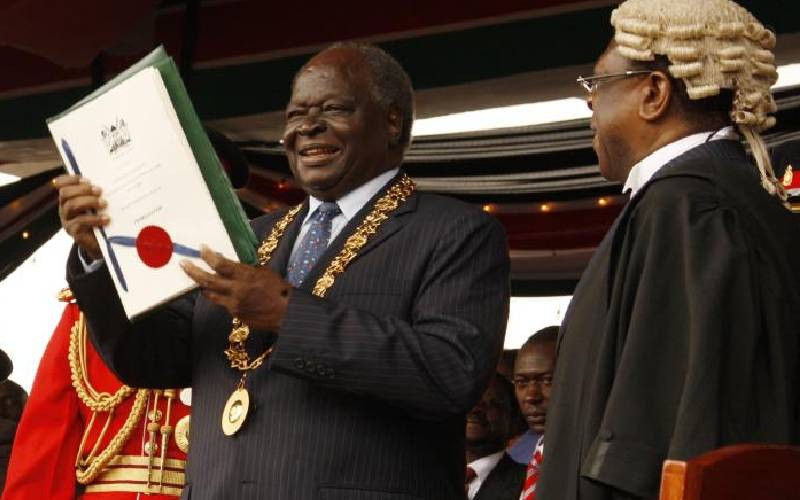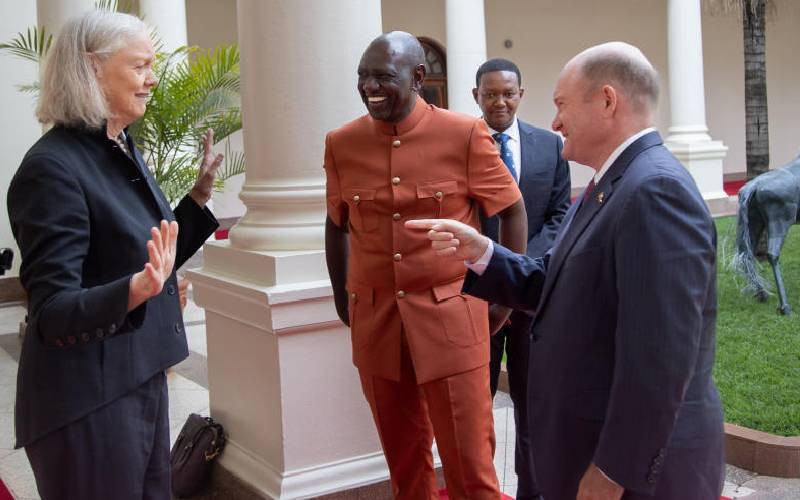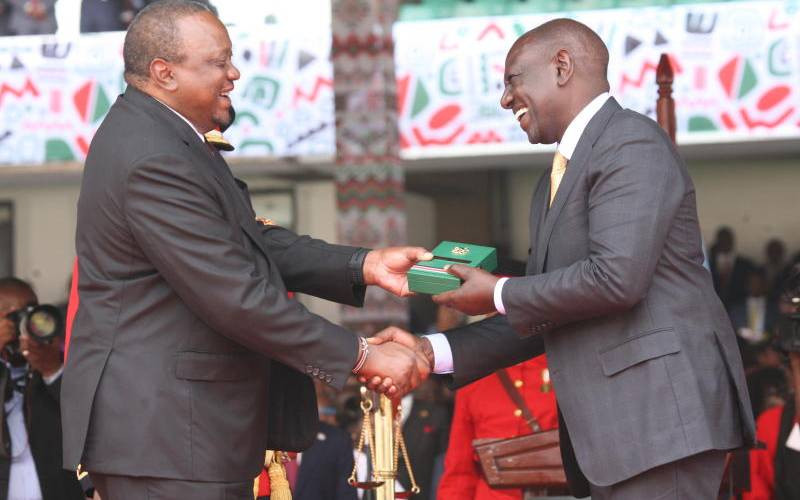A quick look at the Preamble in the Constitution of Kenya promulgated in 2010 gives one an impression that Kenya is comprised of a just and equal society. Specifically, the preamble begins with a clause, “We the people of Kenya…” and continues to state, “RECOGNISING the aspirations of all Kenyans for a government based on the essential values of human rights, equality, freedom, democracy, social justice and the rule of law…”
It is this very beginning part of our constitution that portrays it as a noble document that guarantees a heaven-like country whose citizens would be proud to belong to. Unfortunately, this constitution has turned to be mere words written on paper, just like any other book, newspaper or magazine. The words in it have little meaning to the lives of majority of Kenyans.
Being a democratic country, it would be expected that all the Laws and decisions made by the ruling class are a reflection of the will of the majority of Kenyans exercised through their representatives in the National and County Assemblies.
On the contrary, what we have witnessed in the recent past is real cause for worry. Our members of parliament have decided to represent themselves and their wealthy buddies to the detriment of Kenyans who sent them to parliament. We are now witnessing Parliamentary dictatorship where MPs have ganged up to ensure their selfish needs take precedence and any voice of reason or complaints from Kenyans are suppressed.
As I write this, the Leader of majority in Parliament Hon Aden Duale has sponsored a Bill that makes it an offence to be poor in Kenya. The Physical Planning Bill, 2015 requires that property developers and individuals building homes complete construction within five years from the day of issuance of construction permit or face penalties.
What this means is that for one to build a good home he will have to be rich. If enacted into law, days will be gone when the likes of poor teachers and civil servants took their entire working life building a permanent family house which was only completed with pension money after retirement. This kind of venture took about 3 decades. For one to construct a typical 3 bedroom house, about KES 2,000,000.00 is required excluding the cost of land.
For an average civil servant or a school teacher earning KES 30,000.00 a month, the proposed law is an insult. First and foremost, such an employee cannot qualify for mortgage in Kenya where records show that for one to qualify for one he must be earning over KES 300,000.00 a month.
Secondly, such a worker cannot qualify or afford a development loan from commercial banks capable of completing home construction within 5 years. If Duale had consulted his Garrisa constituents, majority of who are below poverty line, he would not have sponsored such a ridiculous Bill. What the Bill seeks to achieve is only known to Duale and his close friends but you can be sure it has nothing to do with his constituents whose interests he is supposed to represent.
Another example is the new excise duty Bill for imported second hand cars that has just passed the third reading in Parliament meaning it only requires presidential assent to become Law. The new amendment makes it more expensive to import a car older than 3 years than a newer one. Any car older than 3 years will attract a lump sum of KES 150,000.00 while newer car will require KES 100,000.00 as excise duty.
The only reason quoted by the proposers of the Bill is carbon emissions, where newer cars are expected to have lesser emissions than older cars. This line of thinking is ridiculous given the level of industrialization in Kenya.
Kenya’s contribution of carbon emissions to the atmosphere is negligible compared to the developed countries and it makes no sense to deny your own citizens an opportunity to own a car citing carbon emissions. If we were concerned about carbon emissions, we would not be investing in the coal energy plant in Kitui, one of the known dirtiest sources of energy in the world.
To me, the ruling class feels that the middle and lower class are importing too many used cars and hence contributing to traffic jam and therefore needs to be slowed down. In addition, the Kenyan wealthy class will have a ready market for their locally used cars once this middle and lower class Kenyans are unable to import second hand cars.
To get a clear picture of my concerns, just consider the following: In Uganda, citizens are allowed to import cars as old as 10 years. For example, a 2005 Toyota Premio sedan from Japan cost $ 4000 (about KES 400,000) CIF Mombasa. A 2008 similar car cost $ 7000 (About KES 700,000) while a 2013 one cost $ 15,000 (KES 1,500,000). Apparently, it’s way much cheaper to own a decent second hand car in Uganda than in Kenya.
A car less than 3 years old is more than 2 times more expensive than a 7 years old one. So by adding more excise duty on cars older than 3 years than that levied on cars less than 3 years old, the government is simply adding more tax burden to the poor. The irony of it all is the fact that the same government allows importation of second hand engines and other spare parts as old as 10 years and above. The new law has the potential of reducing the lower and middle class into second class citizens who are only allowed to buy locally used old cars from the wealthy Kenyans at exorbitant prices.
Word has it that the same government wants to enact a law that prohibit owning small pieces of land, but gives the Minister for Lands liberty to exempt some Kenyans of his choice from the maximum land holding capacity regulations. All these weird laws are being proposed and passed by our MPs with little regard for the concerns of Kenyans they purport to represent.
Stay informed. Subscribe to our newsletter
I have a few things to remind our members of parliament. First, the poor people of Kenya have right to live decent lives in their country. They don’t mind living in a decent house even if it takes 20 years to construct. They don’t mind owning an affordable second hand car from Japan that is 10-years-old.
Their children would be glad to enjoy a ride to church or to Uhuru Park in their dad’s ex-Japan car just the way your children enjoy jet or chopper ride from Mombasa. Never mind carbon emissions, these poor people have braved dense kitchen smoke from traditional wooden stoves for decades.
The dust surrounding them is of more concern than the clean smoke from few ex-Japan cars. These poor Kenyans also don’t mind owning a tiny piece of land which they can afford instead of living as squatters in their own country. They don’t only deserve a 4 by 6 feet piece of plot in Lang’ata cemetery. One more thing; we are not in Kenya by mistake. We are also Kenyans and have equal rights.
Kenyan Student at University of Adelaide
 The Standard Group Plc is a
multi-media organization with investments in media platforms spanning newspaper
print operations, television, radio broadcasting, digital and online services. The
Standard Group is recognized as a leading multi-media house in Kenya with a key
influence in matters of national and international interest.
The Standard Group Plc is a
multi-media organization with investments in media platforms spanning newspaper
print operations, television, radio broadcasting, digital and online services. The
Standard Group is recognized as a leading multi-media house in Kenya with a key
influence in matters of national and international interest.
 The Standard Group Plc is a
multi-media organization with investments in media platforms spanning newspaper
print operations, television, radio broadcasting, digital and online services. The
Standard Group is recognized as a leading multi-media house in Kenya with a key
influence in matters of national and international interest.
The Standard Group Plc is a
multi-media organization with investments in media platforms spanning newspaper
print operations, television, radio broadcasting, digital and online services. The
Standard Group is recognized as a leading multi-media house in Kenya with a key
influence in matters of national and international interest.








